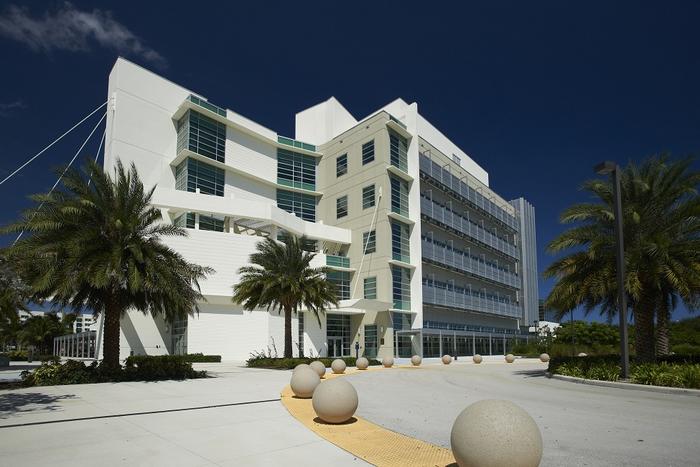Florida Atlantic University’s College of Engineering and Computer Science is among eight university teams in the United States selected to work with NASA and the U.S. military to foster innovation and expertise in the small satellite sector.

Credit: Alex Dolce, Florida Atlantic University
Florida Atlantic University’s College of Engineering and Computer Science is among eight university teams in the United States selected to work with NASA and the U.S. military to foster innovation and expertise in the small satellite sector.
NASA’s CubeSat Launch Initiative (CSLI) is partnering with the U.S. Air Force and U.S. Space Force for the 2024 Mission Concept Program. A CubeSat is among a class of research spacecraft called nanosatellites about the size of a 4-inch cube and typically weighing less than 5 pounds.
Running from May through August, the University Nanosatellite Program (UNP) will provide students with systems engineering training for spacecraft development. The program is designed to refine small satellite project proposals to increase students’ chances of sending their technology into space. The partnership aims to prepare students to work in the space industry while simultaneously enhancing small satellite expertise among faculty at U.S. universities.
“We are incredibly excited and proud to have been selected to work with NASA and the U.S. military to help revolutionize the space domain with tiny yet powerful small satellite technology,” said Stella Batalama, Ph.D., dean, FAU College of Engineering and Computer Science. “Importantly, this initiative will offer participating students invaluable systems engineering training specific to spacecraft development and is part of NASA’s broader strategy to engage and retain students in STEM fields to build a robust pipeline of talent in the aerospace sector.”
The UNP teams will meet at NASA’s Kennedy Space Center in Florida for a four-day kickoff meeting in May, followed by seven weeks at the Air Force’s University Nanosatellite Program facilities in Albuquerque, New Mexico. During their time in Albuquerque, three students from each team will intern with the Space Dynamics Laboratory, receiving direct mentorship and guidance from small satellite experts to refine their proposals and enhance their project’s viability for spaceflight under NASA’s CSLI or Air Force nanosatellite launch opportunities.
The program culminates in final presentations held in Albuquerque, with participants also encouraged to attend the Small Satellite Conference in Logan, Utah, in August.
The FAU UNP is spearheaded by Oscar M. Curet, Ph.D., an associate professor in the Department of Ocean and Mechanical Engineering and a member of FAU’s Center of Connected Autonomy and Artificial Intelligence (CA-AI); and George Sklivanitis, Ph.D., Schmidt Research Associate Professor, a fellow of FAU’s Institute for Sensing and Embedded Network Systems Engineering (I-SENSE), and a senior member of CA-AI. Curet’s research interests and expertise include fluid dynamics, biomimetics and biological locomotion, hydrodynamics of underwater vehicles and energy harvesting. Sklivanitis’ research interest and expertise include autonomous radios, ocean Internet of Things, networked AI and connected robotics.
The three students selected for the FAU UNP are Vitas Diktanas, a Ph.D. student in mechanical engineering with a concentration in aerospace; Sky Rueff, an undergraduate student in mechanical engineering; and Jonathan Mazurkiewicz, an undergraduate student in computer engineering.
The 2024 Mission Concept Program provides funding for all travel, including kickoff, final event, and in-person reviews, allowing faculty and students to formulate teams without straining university resources. NASA uses CSLI as one if its ways to attract and retain students in science, technology, engineering, and mathematics disciplines. This strengthens NASA’s and the nation’s future workforce. The initiative promotes and develops innovative technology partnerships among NASA, U.S. industry, and other sectors for the benefit of all.
Guided by years of spacecraft development history, the UNP structure is divided into four distinct phases: design and development; integration and test; environmental test; and mission operations. Successful completion of each phase is accomplished through specific entrance and exit criteria and phases include various reviews and program down-selects intended to help as many teams as possible achieve successful mission operations.
-FAU-
About FAU’s College of Engineering and Computer Science:
The FAU College of Engineering and Computer Science is internationally recognized for cutting-edge research and education in the areas of computer science and artificial intelligence (AI), computer engineering, electrical engineering, biomedical engineering, civil, environmental and geomatics engineering, mechanical engineering, and ocean engineering. Research conducted by the faculty and their teams expose students to technology innovations that push the current state-of-the art of the disciplines. The College research efforts are supported by the National Science Foundation (NSF), the National Institutes of Health (NIH), the Department of Defense (DOD), the Department of Transportation (DOT), the Department of Education (DOEd), the State of Florida, and industry. The FAU College of Engineering and Computer Science offers degrees with a modern twist that bear specializations in areas of national priority such as AI, cybersecurity, internet-of-things, transportation and supply chain management, and data science. New degree programs include Master of Science in AI (first in Florida), Master of Science and Bachelor in Data Science and Analytics, and the new Professional Master of Science and Ph.D. in computer science for working professionals. For more information about the College, please visit eng.fau.edu.
About Florida Atlantic University:
Florida Atlantic University, established in 1961, officially opened its doors in 1964 as the fifth public university in Florida. Today, the University serves more than 30,000 undergraduate and graduate students across six campuses located along the southeast Florida coast. In recent years, the University has doubled its research expenditures and outpaced its peers in student achievement rates. Through the coexistence of access and excellence, FAU embodies an innovative model where traditional achievement gaps vanish. FAU is designated a Hispanic-serving institution, ranked as a top public university by U.S. News & World Report and a High Research Activity institution by the Carnegie Foundation for the Advancement of Teaching. For more information, visit www.fau.edu.



